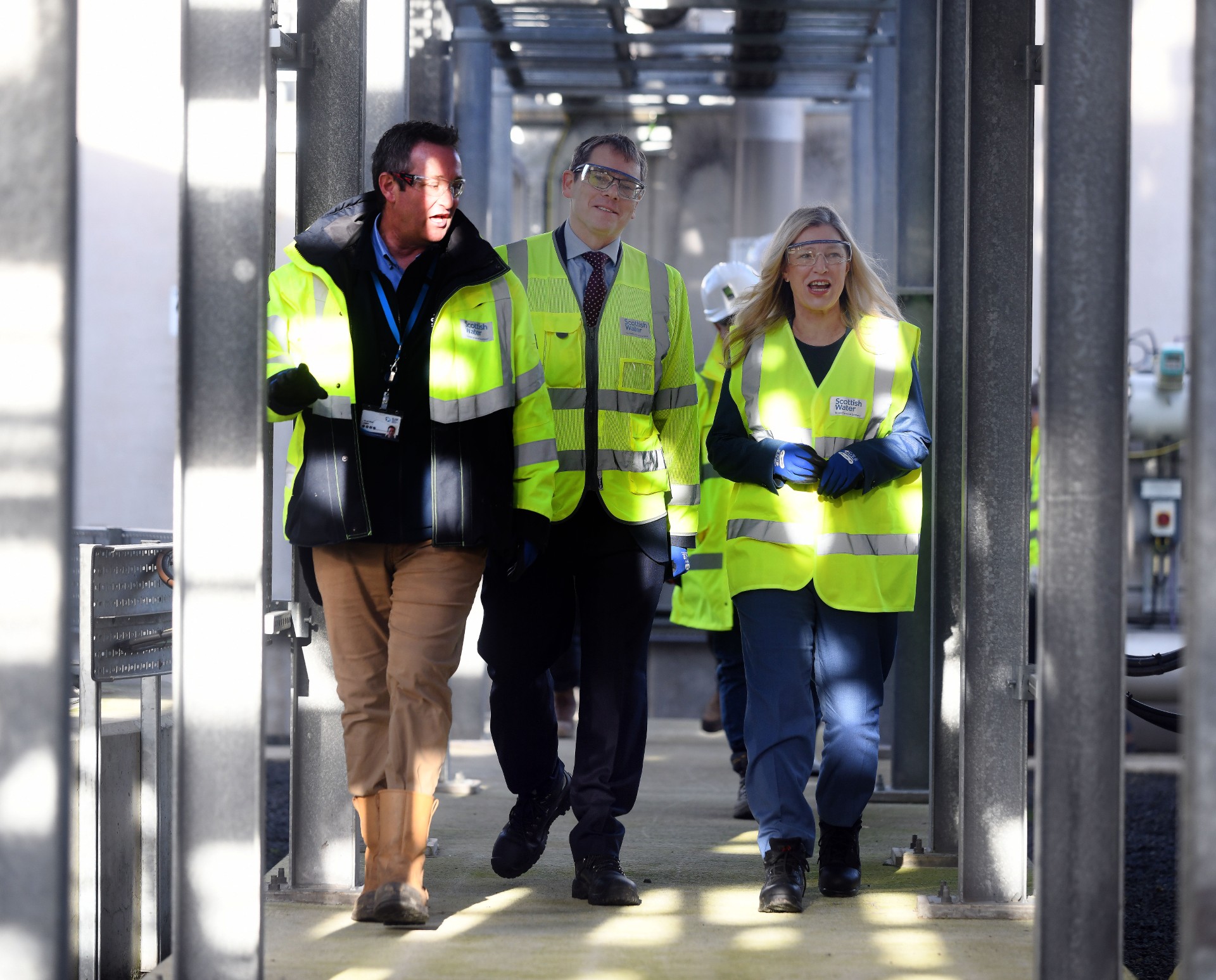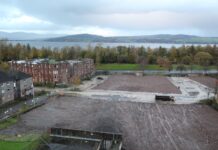
THE construction of Scotland’s lowest carbon waste water treatment (WWTW) works has been completed by Scottish Water.
Built in Winchburgh, the £35 million low carbon WWTW will enable an expected fourfold increase in the town’s population over the coming years.
The completion of the project was celebrated today with an opening ceremony and tree-planting led by Gillian Martin MSP, acting cabinet secretary for net zero and energy, alongside Scottish Water’s chief executive, Alex Plant, and pupils from Winchburgh Primary School.
The West Lothian community has a rich history and was at the centre of Scotland’s shale oil industry a century ago. It is now undergoing a fresh transformation, with the planned addition of around 3,800 new homes by 2032, alongside associated commercial development and community facilities.
Gillian Martin said, “I am delighted to be opening the Winchburgh wastewater treatment works. This state-of-the-art facility delivers on the Government’s key priorities of providing excellent public services and tackling climate change.
“It is a perfect example of Scottish Water’s determination to work collaboratively to find new innovative ways to deliver effective and efficient services while protecting the environment and delivering our net zero commitments.
“To be here at the opening ceremony alongside pupils from the local Winchburgh Primary School is the perfect reflection of how what we do today impacts the lives of future generations.”
The new waste water treatment works has been delivered by Scottish Water’s delivery partner, ESD – a joint venture between Binnies, MWH Treatment, and Galliford Try – and replaces an ageing WWTW, previously located on adjacent land, which had come to the end of its operational life. The previous WWTW served fewer than 4,000 customers, while the new works is capable of supporting the needs of more than 16,000 people.
The new site’s innovative Nereda treatment technology, developed by Royal HaskoningDHV and provided via its UK license partner EPS, reduces energy usage by up to 50% compared with alternatives, while providing an excellent standard of treatment to protect the local environment.
The aerobic granular biomass at the heart of the Nereda technology enables multiple stages of the waste water treatment process to take place within one of three individual tanks, operating in sequence. This means more waste water can be treated faster and with less chemicals, in a smaller site area and with a much-reduced carbon footprint.
Winchburgh is only the second site in Scotland to use the low carbon technology, following a pioneering project in Inverurie with the same supply chain partners. Early collaboration in the design of the West Lothian site and learning from Inverurie enabled further significant carbon savings from using low carbon stainless steel rather than concrete for the main tanks, reduced excavation and greater use of off-site fabrication.
Solar generation has also been fitted to the roof of the site’s control building to meet a significant part of the site’s remaining energy needs and EV chargers have been installed to support the electrification of Scottish Water’s vehicle fleet.
Scottish Water chief executive Alex Plant said, “Scottish Water is committed to investing in low carbon innovation to improve our services, support housing and economic growth and protect Scotland’s environment.”
“What has been achieved at Winchburgh through close collaboration with our specialised supply chain partners is vital to the future of this community, but it also provides a blueprint for the future of our investment programme across Scotland, supporting much-needed new homes and enabling sustainable economic growth.
“Our delivery of this project reflects a big step forward, driving down carbon emissions in construction without compromising on quality. We look forward to continuing work with our partners to deliver the further improvements we need to rise to the challenges of a changing climate and go beyond net zero emissions by 2040.”
ESD COO, Peter Walsh, added, “Reflecting our close relationship with Scottish Water, the Winchburgh project has set a new benchmark in collaboration between our two companies. ESD is proud to be a Scottish Water Alliance partner and we share their ambition to achieve net zero by 2040. The technologies behind the Winchburgh plant will help us achieve that goal.
“I thank the ESD team and all our supply chain partners for their commitment and expertise which has resulted in the successful completion this flagship project. Winchburgh has provided us all with invaluable experience that will benefit future similar projects.”
“The Nereda wastewater treatment process at Winchburgh is designed to meet more stringent effluent quality standards, with the advanced process control offering further optimisation to reduce operational costs and carbon emissions,” added Paul Lavender, UK Water Utilities Director at Royal HaskoningDHV. “This site demonstrates the latest low-carbon manufacturing approaches, and we remain committed to supporting Scottish Water in continuing to maximise performance and achieve cost savings.”








